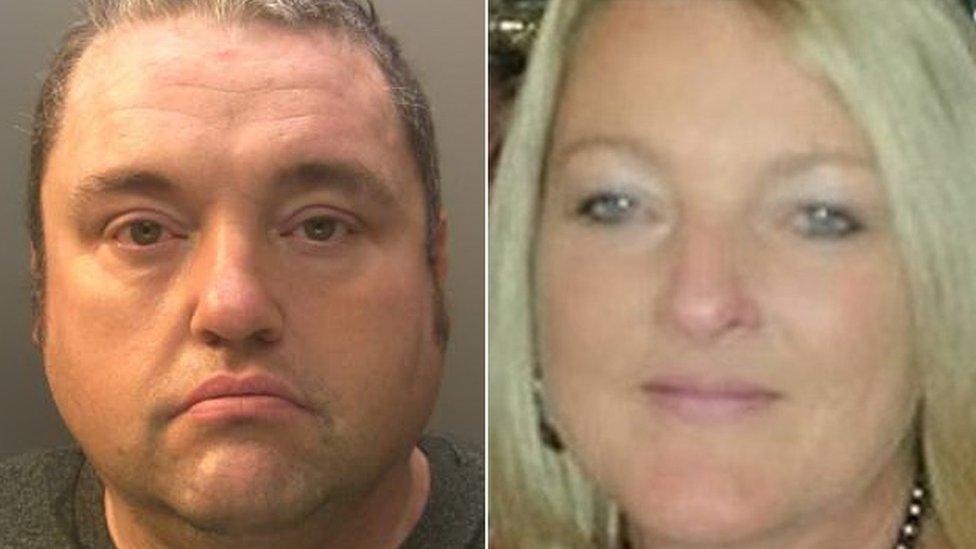Crash Detectives: CCTV reality of fatal garage crash
- Published
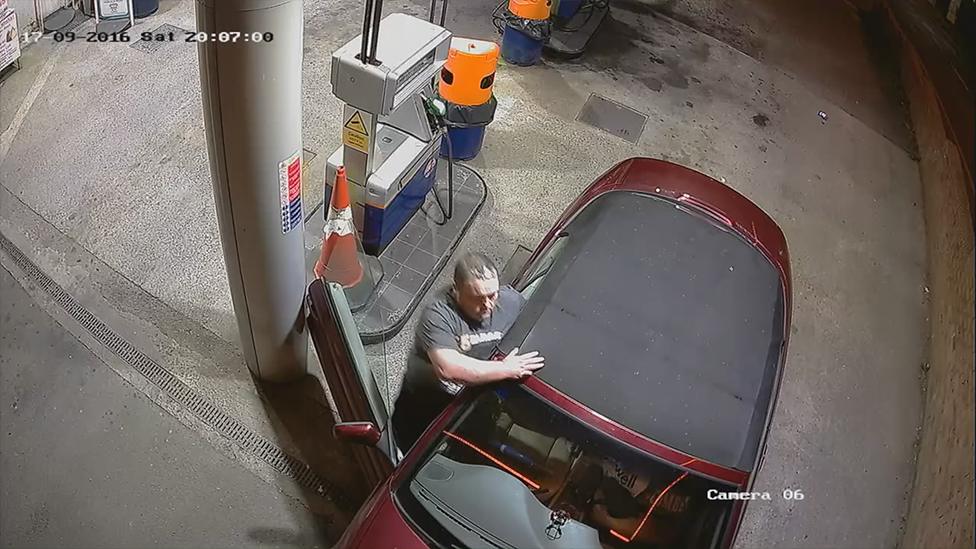
In a new television series entitled The Crash Detectives, BBC Wales follows the work of Gwent Police's Collision Investigation Unit.
In the first episode of four programmes, producer Jenny Casterton finds out if CCTV can reveal the truth behind a fatal motorbike crash.

It was just after 20:00 GMT on a warm September Saturday when Mark Morgan drove into his local garage, pulling up alongside his usual petrol pump.
As he paid for his £15 worth of fuel for his Volvo C70, he complained to the cashier of being tired.
He told how he had been napping on the sofa after an exhausting afternoon with his nieces and nephews, and was looking forward to picking up a Chinese takeaway.
That day, keen motorcyclists Ray and Brian Jones had been celebrating their 28th wedding anniversary.
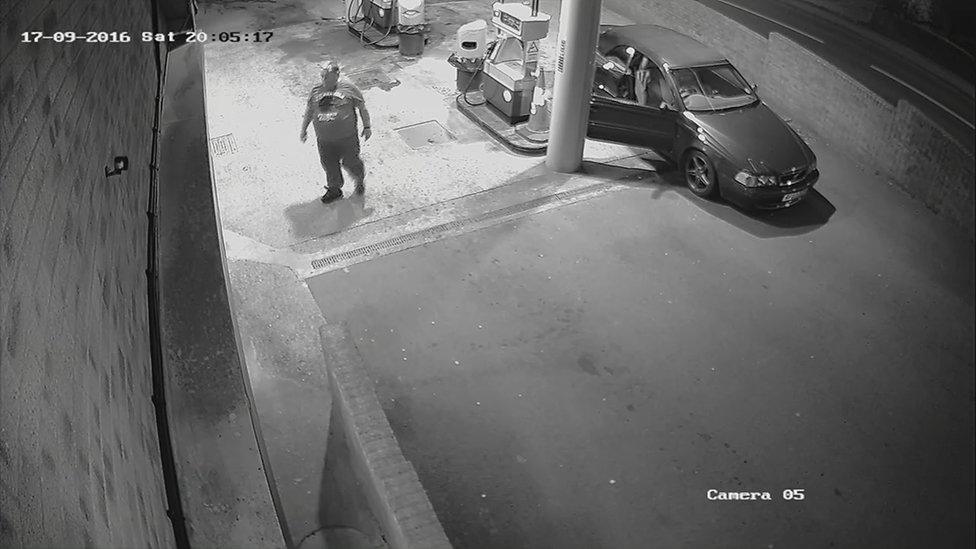
They and another couple had ridden to west Wales for a day out. They were returning home to Blaenavon, south Wales, having made plans for an Indian takeaway.
The Jones's were nearing home as they approached the petrol station.
The cashier, who had just moments before served Mr Morgan, recalls his car revving loudly as he drove away.
Seconds later there was a sickening bang.
Morgan called 999.
"I need an ambulance please to the Gulf garage in Blaenavon… what's happened is, I've come out of the petrol station and as I've come across the road, it's hit me as I've come out," he said.
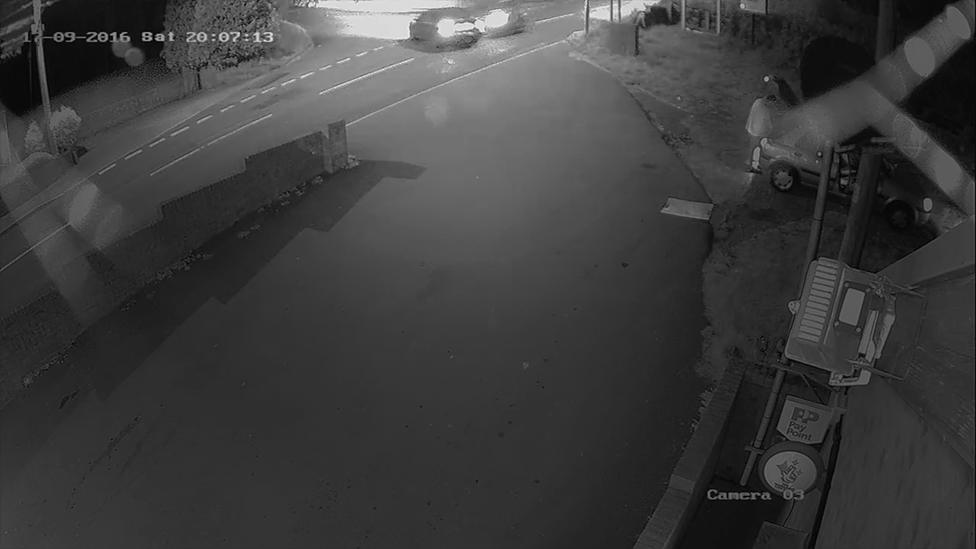
Katie Jenkins had just put her two daughters to bed, and was settling down to watch TV when she answered the phone call that ripped her life apart.
"It was my dad, sobbing so hard I could barely understand what he was saying," she recalls.
"All I heard was 'there's been an accident'.
She always worried when her parents were out on their bike. This was the call to confirm her worst ever fears.
Her beloved 50-year-old mother Ray - named after a ray of sunshine - was dead; killed on the road, just three miles from home.
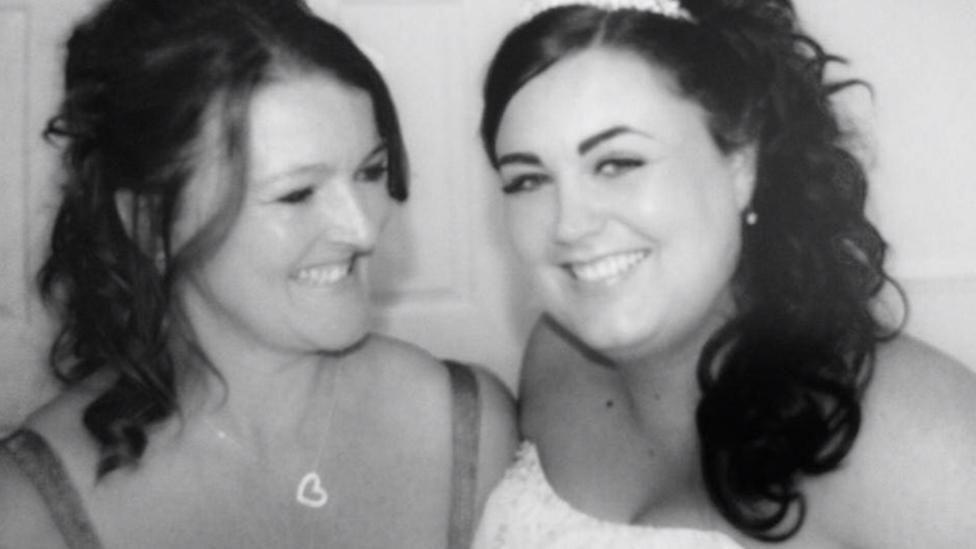
Katie Jenkins with her late mother Ray Jones
Morgan was arrested at the scene, and taken back to the police station where he gave an account of what had happened.
He said he had been to the garage "countless times" before.
"I've looked left first, I looked right up the road, and then I looked left again, and then I went," he told police.
"I didn't see that bike guys. I didn't see that bike until I was virtually on top of the white lines and that's when he clipped me."
But as forensic collision investigator Richie Wyatt arrived at the crash scene, a different story had started to emerge.
Witnesses had told officers that the car driver appeared to have pulled straight out of the junction - without looking.
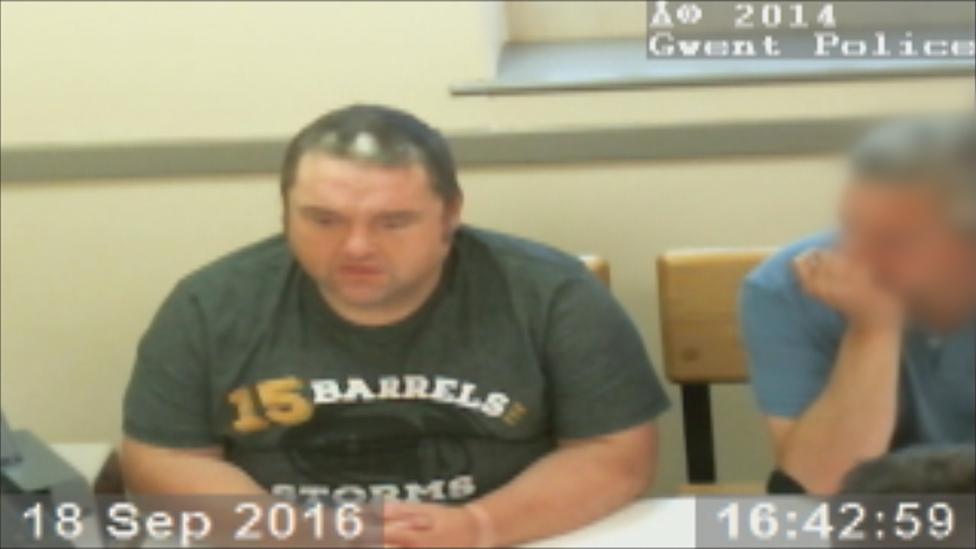
Mark Morgan tells police officers he did not see the bike before pulling off
With conflicting versions of events, it was up to Mr Wyatt to establish the truth.
"I remember looking at the road surface, and there were so many marks there, gouge marks, scrape marks, debris from the motorcycle," he said.
He pinpointed the exact spot where the motorcycle had collided into the rear driver's side of the vehicle.
But as he continued to build a picture, several things stood out for him.
The motorbike was in good condition and evidently well maintained. The distance the bike had travelled after the impact was relatively short - suggesting it crashed at fairly low speed.
"The pressure was on," Mr Wyatt recalls.
"You only get one chance of preserving all the evidence, and you've got to do it right. It's difficult because somebody's lost their loved one, and if somebody is at fault, then that's my job to establish those facts and prove who is responsible."
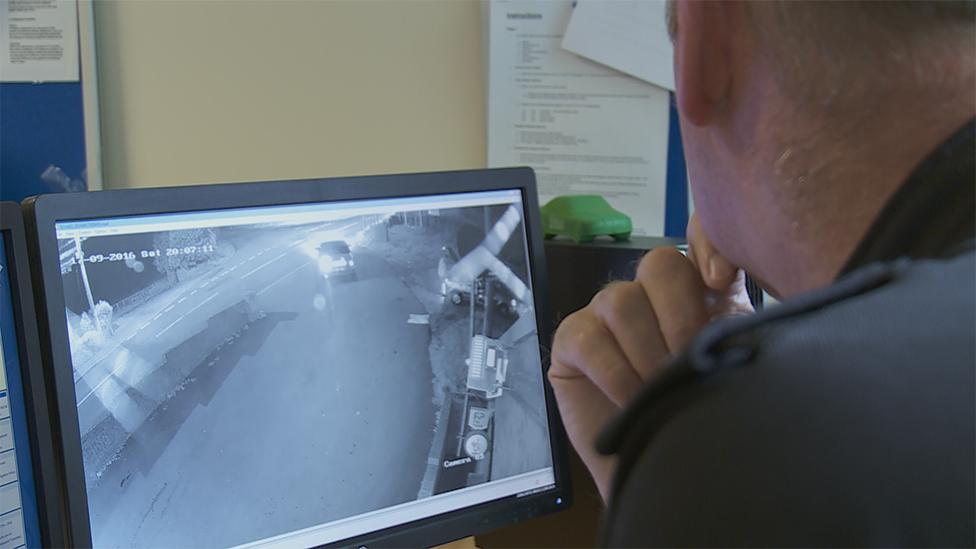
CCTV footage taken from the garage was examined by Mr Wyatt.
"When you're driving behind a vehicle," he says, "you to try assess what type of person is driving that car, from the way it's being driven - what their demeanour is like, what their character is like.
"The way he's driven into that garage - he's come in at speed, very blasé with his presence. He's opened his door, and hit the pillar.
"No sooner had he started and he was gone. He was just totally focused on doing what he wanted to do to get from a to b as quickly as possible."
But had the footage captured the exact moment that the car and the motorbike collided?
It had - with shocking clarity.
It appeared that the driver had pulled straight out onto the road without hesitation.
But what exactly could the driver see as he did so?
To understand that Gwent Police's collision investigation unit, led by Mr Wyatt, staged a reconstruction.
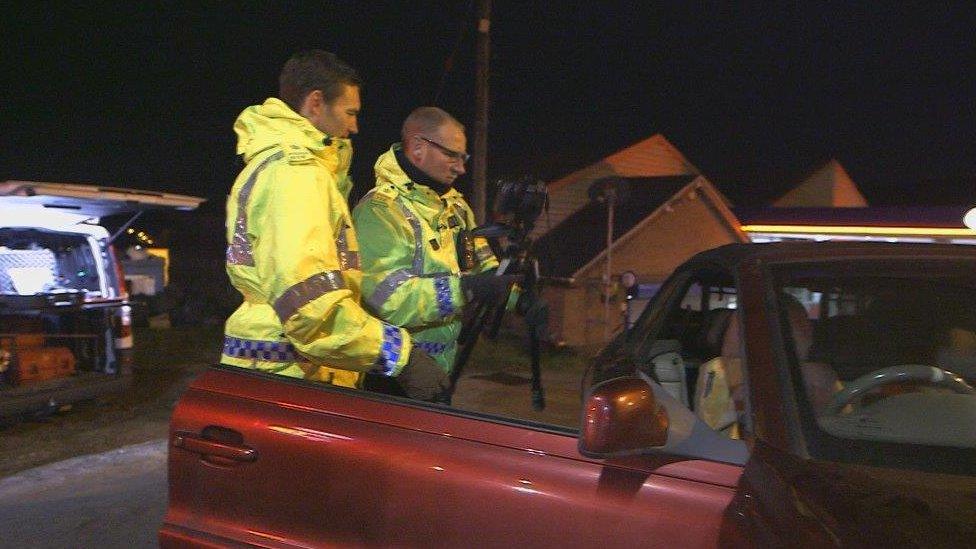
The Volvo was brought back to the scene, and put back in position at the exit of the forecourt.
The live view of the CCTV helped to line it up to where it was on the night, while a police motorcyclist was called in to assume the role of the couples on their bikes.
The team set about capturing exactly what the driver and motorcyclist could see in the seconds leading up to the crash.
As Mr Wyatt examined the photographs - taken at 40, 30, 20 and 10 metres away from the point of impact - there was a glaring consistency.
As the photos showed, there was no doubt the headlamp of the motorbike should have been clearly visible to Morgan.
'No comment'
"It's something to put to the driver in interview," Mr Wyatt says. "What are his thoughts on that? Why hasn't he seen him? Has he looked?"
Morgan responded to initial questions with "no comment".
But then he was shown the CCTV. It was the first time he had seen the reality of that night - the consequences of his actions, captured on camera.
His demeanour changed.
In a statement read to the officers, he admitted that he had pulled out of the junction without looking properly, and accepted that his previous recollection of the night was "incorrect".
"I think people try to convince themselves that this is what has happened, and from his perspective maybe there was a little bit of that, but he would have known that he didn't look at all," says Mr Wyatt.
"Right from day one - he didn't look at all."
Morgan was charged with causing death by dangerous driving. He pleaded not guilty, arguing his driving may have been careless, but not dangerous.
Brian Jones, whose wife Ray died in the crash, told Newport Crown Court that he had been riding motorbikes for about 12 years.
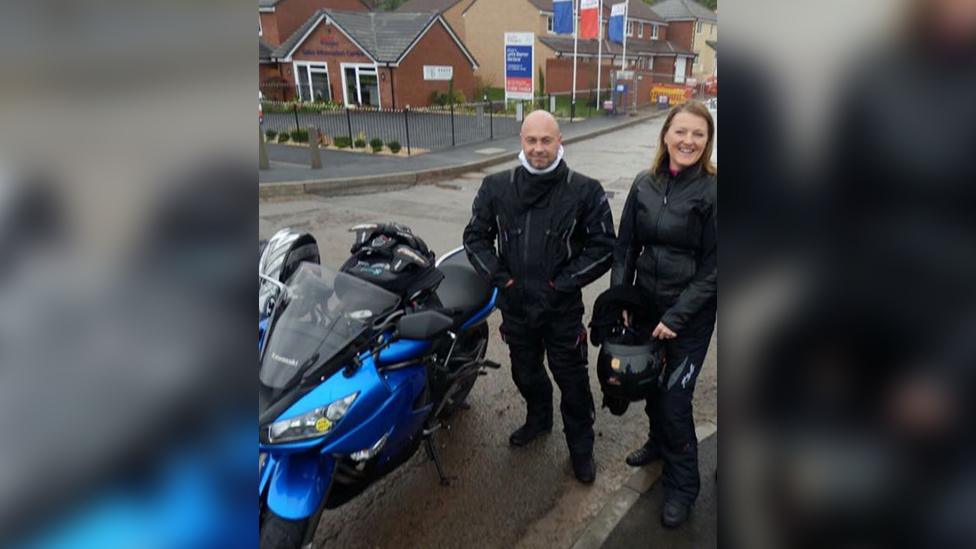
Brian and Ray Jones
That day, he told the jury, he was riding slightly ahead of his friends and was holding the bike back on the gears as he came down the hill - when the car appeared.
"I activated the brakes," he said. "The bike dipped and tried to swerve around the back end of the car. It swerved a little bit, but not enough."
Giving evidence, Morgan said that on the night of the crash he had "exercised human complacency".
He put it down to "lack of concentration" and said he had safely pulled out of that junction hundreds of times before. "I didn't look right until my car was going out into the road. I accept a hundred percent that I should've brought that car to a stop."
The evidence gathered by the collision investigation team proved that had Morgan taken the time to look - he would have been able to see the bikes travelling down the hill.
On the final day of the trial Morgan changed his plea to guilty.
Sentencing him at Cardiff Crown Court, Judge Tom Crowther told him: "Ray and Brian Jones had been out for a pleasant afternoon out, and were riding back in a staggered formation to preserve stopping distances if they needed to brake - to see and be seen.
"You had slept during the afternoon. You wanted to refuel before visiting your favourite Chinese.
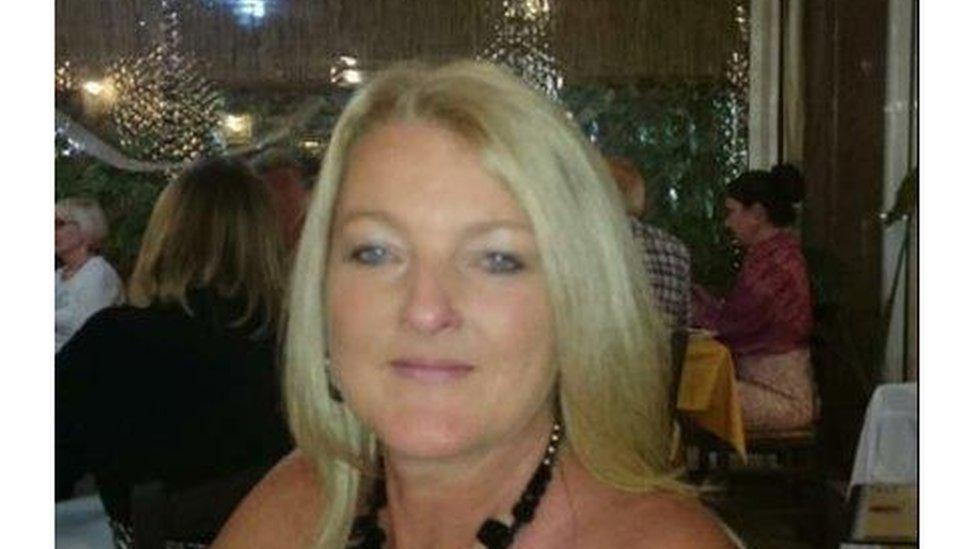
Ray Jones
"You were plainly in a rush, and careless. You spent little over a minute at the fuel station. You told the cashier that you had just woken up and that you were tired.
"There can be no dispute as to your manner leaving the fuel station, because there's the CCTV. But she said she heard your car rev more than normal as you took off.
"Instead of waiting, and assessing the traffic, you didn't even look. You put your foot down to the floor and drove straight across the carriageway. The bikes were only 20 metres away.
"A human needs time to process what it sees. Brian Jones's reactions were good, but there was nothing he could do to prevent the collision, and they were thrown from the machine. Her heart stopped beating from her injuries.
'Deliberate lie'
"You now accept the blindingly obvious - that this was dangerous.
"You said you stopped and looked. That was a deliberate lie."
He said that Mr Jones's riding was not in question at all, adding: "I see no criticism to be made here - except of you. This is now a family broken. Time will plainly have some effect, but, like any fracture, this will not heal without trace."
The judge said victim impact statements written by Ray Jones's family had affected him deeply. He said he found them "lacerating" to read.
He told Morgan he had precious little mitigation against his sentence, and said he would have no credit for his eventual guilty plea.
"Maybe the enormity of what you have done has finally settled on you.
"It was a seriously dangerous manoeuvre that you carried out. Brief, but dangerous. Nothing I can do can repair the damage that you have done or make things right."
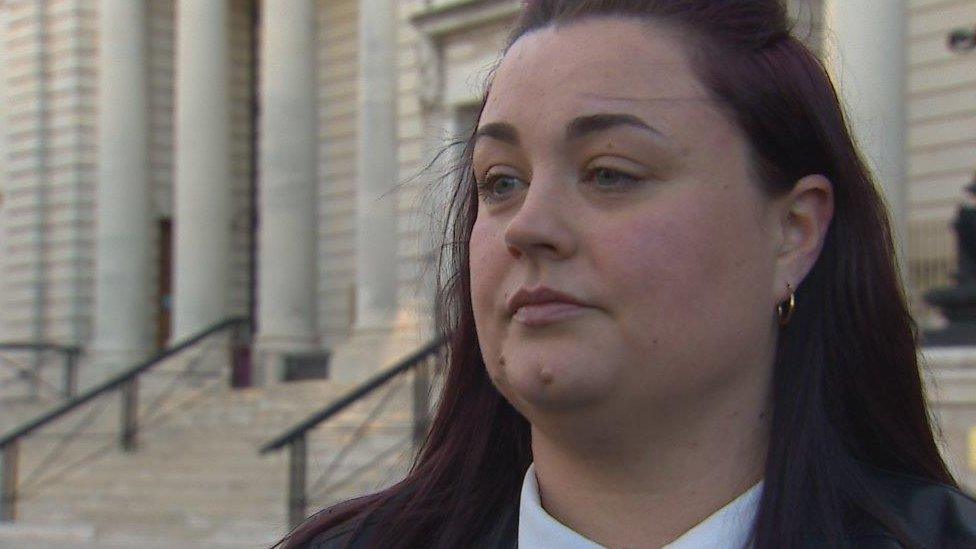
Katie Jenkins speaking outside court
Morgan was sentenced to four years in prison and disqualified from driving for six years.
Katie Jenkins, who wanted the CCTV to be made public, said Morgan had "ripped our family apart".
"He's taken a grandmother, a daughter, a mother, a wife, there's just so many people's lives that have been affected by his stupid, stupid driving," she adds.
"I really don't think that he understands how precious mam was, to so many people. And that nothing they would've given today would replace mam.
"His driving was completely reckless…he got into the car and he just drove. All for a takeaway. He took my mam's life, just for a takeaway."
Mr Wyatt is one of four dedicated collision investigators at Gwent Police. He grew up watching his traffic officer father at work - impressed by the cars he got to drive - and decided to follow in his footsteps.
With eight years experience investigating crash scenes, he is now acutely aware of the far-reaching implications of a serious incident on the road.
"I think what people fail to realise is the consequences after the collision, the loss of life, and how that family rebuilds afterwards," he said.
"It's never going to go away for them. That split second in history has changed the future for the family involved."
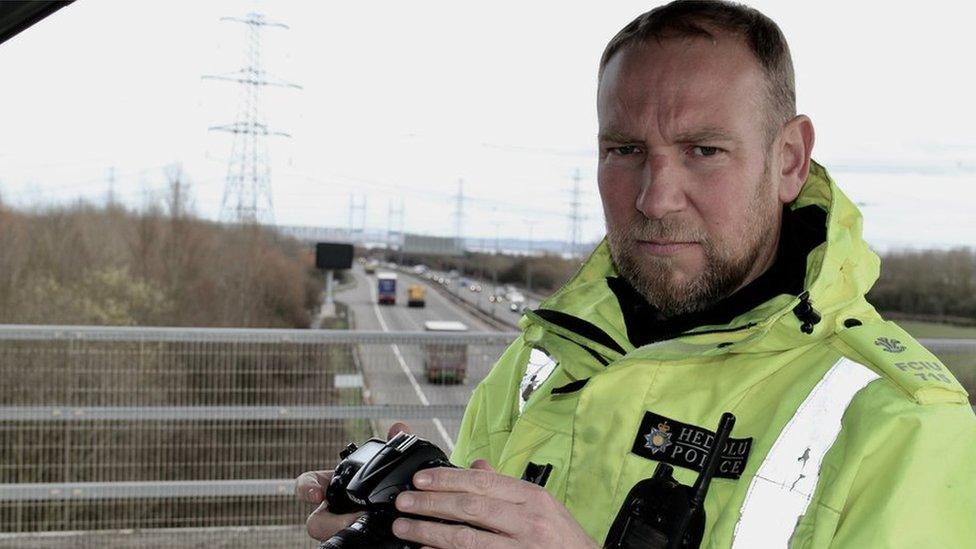
Collision investigator Richie Wyatt
And it is getting an explanation for those relatives that drives him to get to the truth of every crash.
"You look at the CCTV and you think, he almost avoided that. It was the motorcyclist who tried to do the thinking for the car driver to avoid the collision taking place," he said.
"It was a collision that was totally avoidable."
Watch The Crash Detectives at 20:30 BST on BBC One Wales and on BBC iPlayer
- Published15 December 2017
